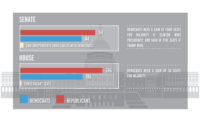A fight over a 4G network and competitor to the Global Positioning System is heating up in Washington, as a coalition that includes major construction industry groups and heavy-equipment manufacturers is trying to block a move by LightSquared, Reston, Va., to launch a wireless broadband network.
An industry group called the Coalition to Save Our GPS contends that the LightSquared plan would involve building some 40,000 ground stations and create interference with the existing GPS signals, which would disrupt systems such as high-precision GPS used in dredging operations in U.S. ports, as well as GPS that is used to guide and manage construction machinery.
All the groups on either side of the issue are awaiting a report by a working group appointed by the Federal Communications Commission on the GPS issue. The group is expected to submit its report to the FCC on July 1, according to the coalition.
Meanwhile, more construction industry groups are joining the lobbying group. The coalition announced today that 22 organizations had joined its roster, including the Associated General Contractors of America, pushing membership to more than 60 companies and organizations. It also has more than 100 associate members.
AGC joined equipment giants Caterpillar and Deere and Co. and such groups as the American Association of State Highway and Transportation Officials, American Council of Engineering Companies/Council of Professional Surveyors and Association of Equipment Manufacturers.
Barry Schaffter, Deere senior vice president and chief information officer, said on June 22, “The use of GPS technology is vital to thousands of people who make their living with agricultural and construction equipment. It is not acceptable to allow interference to these important industries when there is no practical solution to mitigate the problem of interference.”
AEM President Dennis Slater said on June 24, “Not only would the 40,000 ground stations very likely render commercial and private GPS signals unreliable and in some cases useless, but implementing LightSquared's plan would add unnecessary burdens to the U.S. economy.”
The House Appropriations Committee has sided with the LightSquared critics. The committee on June 23 added an amendment to a fiscal 2012 spending bill that funds the Federal Communications Commission that would slow down LightSquared’s plan. The amendment would prevent the FCC from implementing a Jan. 26 waiver that would allow LightSquared to construct its ground stations.
LightSquared said on June 20 that tests indicated one block of frequencies it planned to use for its initial nationwide wireless broadband network would create interference with many GPS receivers. But it added that it has been developing an alternate plan to use another block of the spectrum that it says would not pose such a problem.
That second block of frequencies is lower on the spectrum band and further away from GPS frequencies, LightSquared says.



Post a comment to this article
Report Abusive Comment